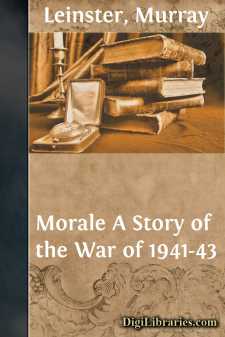Categories
- Antiques & Collectibles 13
- Architecture 36
- Art 47
- Bibles 22
- Biography & Autobiography 810
- Body, Mind & Spirit 47
- Business & Economics 24
- Computers 4
- Cooking 94
- Crafts & Hobbies 3
- Drama 346
- Education 45
- Family & Relationships 34
- Fiction 11811
- Games 19
- Gardening 17
- Health & Fitness 33
- History 1377
- House & Home 1
- Humor 147
- Juvenile Fiction 1873
- Juvenile Nonfiction 202
- Language Arts & Disciplines 88
- Law 16
- Literary Collections 686
- Literary Criticism 179
- Mathematics 13
- Medical 41
- Music 39
- Nature 179
- Non-Classifiable 1768
- Performing Arts 7
- Periodicals 1453
- Philosophy 62
- Photography 2
- Poetry 896
- Political Science 203
- Psychology 42
- Reference 154
- Religion 451
- Science 126
- Self-Help 7
- Social Science 80
- Sports & Recreation 34
- Study Aids 3
- Technology & Engineering 59
- Transportation 23
- Travel 463
- True Crime 29
Murray Leinster
Murray Leinster, the pen name of American writer William Fitzgerald Jenkins, was a prolific author known for his contributions to science fiction and pulp magazines. He wrote over 1,500 short stories, essays, and radio scripts, and is best remembered for his pioneering work in the genre, including the 1945 story "First Contact," which introduced the concept of universal translators. Leinster's innovative ideas and engaging storytelling earned him the title "the Dean of Science Fiction," and he was honored with a Retro Hugo Award for Best Novelette for "First Contact" in 1996.
Author's Books:
Sort by:
by:
Murray Leinster
It started in Greece on the day after tomorrow. Before the last act raced to a close, Coburn was buried to his ears in assorted adventures, including a revolution and an invasion from outer space! We're not given to throwing around the word "epic" lightly, but here is one! Swashbuckling action, a great many vivid characters, and a weird mystery—all spun for you by one of the master...
more...
by:
Murray Leinster
CHAPTER IThe Tube The generator rumbled and roared, building up to its maximum speed. The whole laboratory quivered from its vibration. The dynamo hummed and whined and the night silence outside seemed to make the noises within more deafening. Tommy Reames ran his eyes again over the power-leads to the monstrous, misshapen coils. Professor Denham bent over one of them, straightened, and nodded. Tommy...
more...
by:
Murray Leinster
I. The whole thing started when the clock on the Metropolitan Tower began to run backward. It was not a graceful proceeding. The hands had been moving onward in their customary deliberate fashion, slowly and thoughtfully, but suddenly the people in the offices near the clock's face heard an ominous creaking and groaning. There was a slight, hardly discernible shiver through the tower, and then...
more...
by:
Murray Leinster
There wasn’t anything underneath but clouds, and there wasn’t anything overhead but sky. Joe Kenmore looked out the plane window past the co-pilot’s shoulder. He stared ahead to where the sky and cloud bank joined—it was many miles away—and tried to picture the job before him. Back in the cargo space of the plane there were four big crates. They contained the pilot gyros for the most...
more...
by:
Murray Leinster
CHAPTER ONE Jed Cochrane tried to be cynical as the helicab hummed softly through the night over the city. The cab flew at two thousand feet, where lighted buildings seemed to soar toward it from the canyons which were streets. There were lights and people everywhere, and Cochrane sardonically reminded himself that he was no better than anybody else, only he'd been trying to keep from realizing...
more...
by:
Murray Leinster
Nobody ever saw the message-torp. It wasn't to be expected. It came in on a course that extended backward to somewhere near the Rift—where there used to be Huks—and for a very, very long way it had traveled as only message-torps do travel. It hopped half a light-year in overdrive, and came back to normality long enough for its photocells to inspect the star-filled universe all about. Then it...
more...
by:
Murray Leinster
1 The little Med Ship came out of overdrive and the stars were strange and the Milky Way seemed unfamiliar. Which, of course, was because the Milky Way and the local Cepheid marker-stars were seen from an unaccustomed angle and a not-yet-commonplace pattern of varying magnitudes. But Calhoun grunted in satisfaction. There was a banded sun off to port, which was good. A breakout at no more than sixty...
more...
by:
Murray Leinster
PART I "... The profound influence of civilian morale upon the course of modern war is nowhere more clearly shown than in the case of that monstrous war-engine popularly known as a 'Wabbly.' It landed in New Jersey Aug. 16, 1942, and threw the whole Eastern Coast into a frenzy. In six hours the population of three States was in a panic. Industry was paralyzed. The military effect was...
more...
by:
Murray Leinster
They were broadcasts from nowhere—sinister emanations flooding in from space—smashing any receiver that picked them up. What defense could Earth devise against science such as this? Did the broadcasts foretell flesh-rending supersonic blasts? The first broadcast came in 1972, while Mahon-modified machines were still strictly classified, and the world had heard only rumors about them. The first...
more...
by:
Murray Leinster
Bordman knew there was something wrong when the throbbing, acutely uncomfortable vibration of rocket blasts shook the ship. Rockets were strictly emergency devices, these days, so when they were used there was obviously an emergency. He sat still. He had been reading, in the passenger lounge of the Warlock—a very small lounge indeed—but as a senior Colonial Survey officer he was well-traveled...
more...











